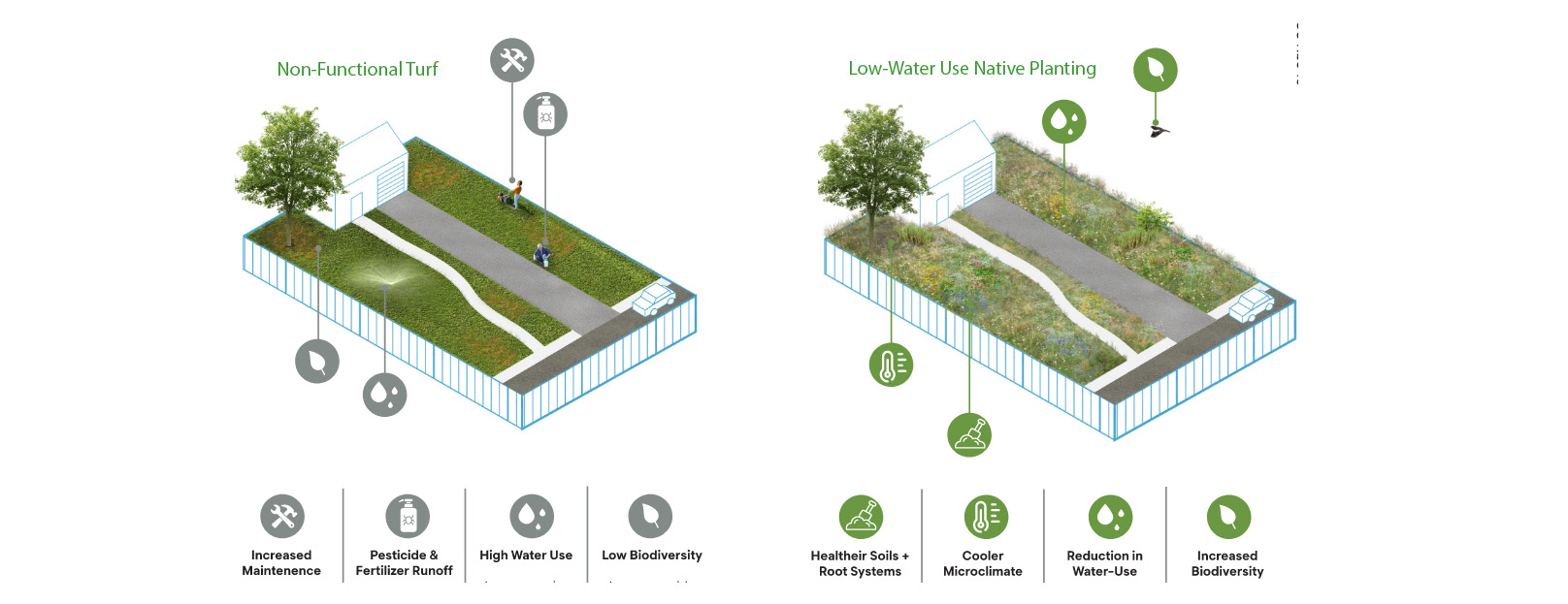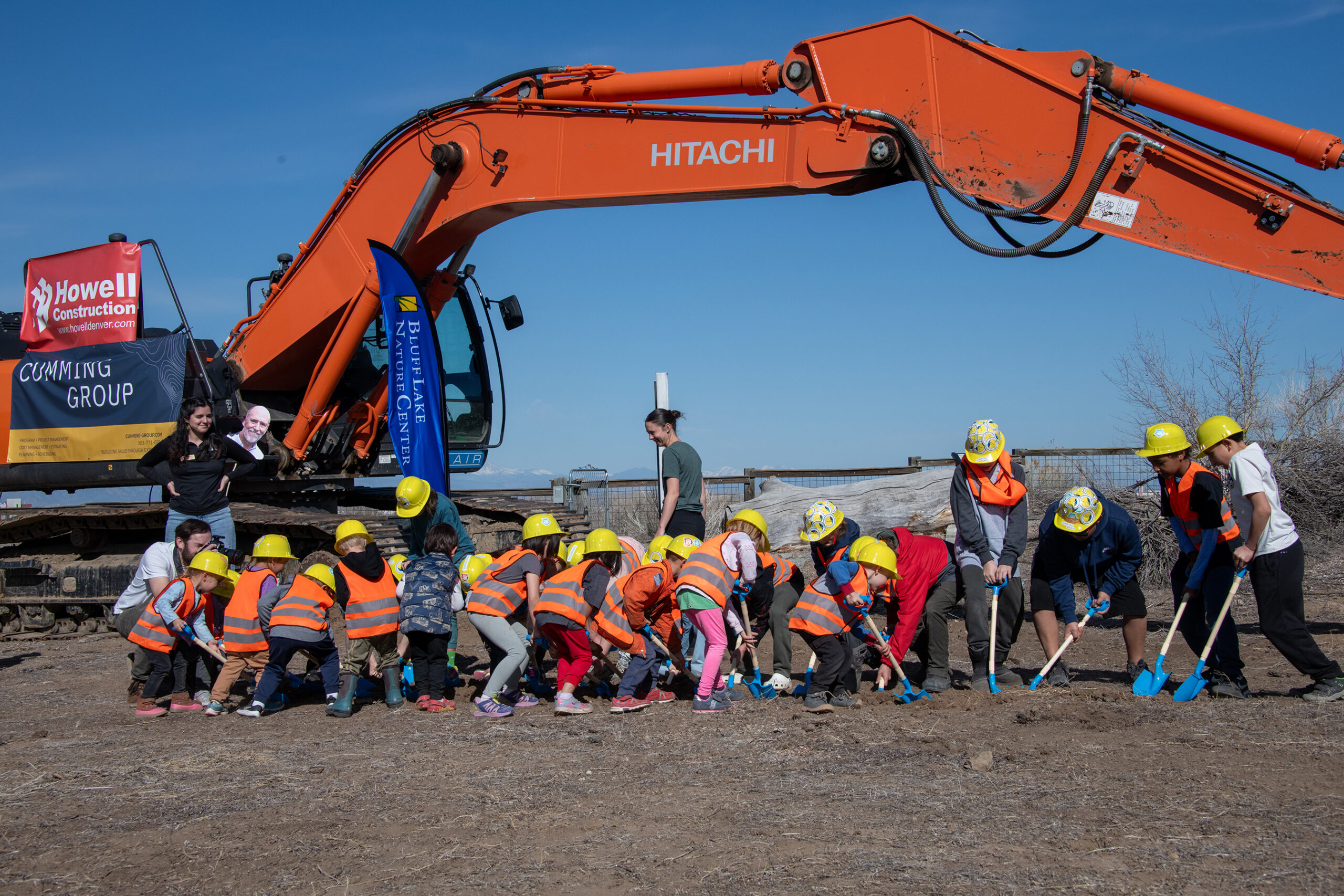
Across the Western U.S., water conservation is now the linchpin of landscape design. As cities face escalating water shortages due to climate change, new regulations—like Colorado’s turf ban—are compelling municipalities to rethink how they approach urban landscapes. At Superbloom, we specialize in these transformations, working alongside cities and communities to create resilient, ecologically responsible gardens, parks and outdoor spaces.
Leveraging our expertise in water-efficient landscape design, we’re helping cities integrate native plants, xeriscaping, and advanced irrigation technologies to create sustainable urban spaces. Our impact extends beyond design; we’re collaborating with Boulder County to develop a Toolkit for Nature-Based Solutions to Climate Change and partnering with Denver Public Schools to establish a Sustainable Landscaping Standard. Through these initiatives, we’re empowering municipalities across the West to embrace innovative, nature-driven strategies that enhance climate resilience and sustainability.
Understanding Colorado’s New Water Efficiency Law
Colorado’s new law, effective January 1, 2026, prohibits nonfunctional turf, artificial turf, and invasive species on a wide range of properties, pushing municipalities to update zoning, landscaping standards, and development codes. As cities and towns across the state align with these regulations, a wave of landscaping reforms will reshape urban spaces, reducing water consumption and promoting sustainable, resilient landscapes. These changes will drive municipalities to rethink their green spaces, ensuring they contribute to climate adaptation and ecological health.
Why Modernize Landscape Codes?
As Colorado faces the challenges of climate change, the need for resilient landscapes that support communities while ensuring equitable public spaces is more urgent than ever. At Superbloom, we are committed to fostering public understanding of landscape best practices, using creative engagement methods to make policies accessible and meaningful for all. By collaborating with developers, designers, and community advocates, we aim to streamline regulations and ensure that civic decision-making processes are inclusive and transparent. Through art and design, we engage marginalized communities, providing access to essential information and empowering voices in shaping sustainable urban environments.
Why Are These Changes Necessary?
- Water Scarcity: As the West grapples with water shortages, every drop counts. Municipalities must adopt strategies that significantly reduce water usage.
- Rising Temperatures: The warming climate makes traditional turf harder to maintain, prompting cities to adopt resilient landscaping solutions.
- Cost Savings: Water-efficient landscapes reduce municipal maintenance costs while conserving valuable resources.
Creating Resilient Landscape Design in the West
As cities in the West confront water restrictions and climate change, sustainable landscape practices are critical. These solutions help cool urban areas, manage stormwater, improve air quality, reduce flooding, boost mental health, and support biodiversity. By incorporating these methods into urban planning and design, cities can better adapt to climate change, enhance public health, and reduce environmental risks and inequities. Key features of these landscapes include:
- Reduced Turf Areas: Replacing underutilized grass with sustainable alternatives.
- Water-Efficient Planting: Prioritizing plants suited to the dry, high-altitude climate.
- Native Plantings: Incorporating plants adapted to local climates, requiring less water and supporting wildlife.
- Rain Gardens & Bioswales: Natural solutions for stormwater management and runoff reduction.
- Smart Irrigation: Using real-time data to adjust irrigation schedules. Optimizing watering schedules based on weather conditions to minimize water waste.
- Educational Value: Engaging communities with real-time examples of sustainable practices.
Beyond Colorado
This effort for resilient and water efficient landscaping extends far beyond Colorado. With the impacts of climate change intensifying, municipalities around the country are updating their landscape codes to foster water-efficient practices that promote biodiversity, reduce urban heat, and conserve precious resources. States like California, Washington already have restrictions and other states like Utah, Wyoming, Idaho, and Montana are rapidly adopting similar water-saving measures, and cities such as Salt Lake City, Boise, and Denver are increasingly prioritizing smart irrigation systems and native plantings to reduce water consumption. At Superbloom, we’re proud to partner with these cities to implement these strategies, ensuring our landscapes not only thrive but adapt to the region’s unique environmental challenges.
At Superbloom, we specialize in crafting landscapes that don’t just look good—they’re built to last. From reducing turf areas to designing ecologically functional, water-efficient spaces, we’re here to help municipalities across the Rocky Mountain region, the Intermountain West, and beyond achieve long-term sustainability. Contact us today to find out how we can help your city lead the way in landscape innovation.
Here are the articles covering the new Colorado law related to turf bans and water conservation:
- Denver Post: “Colorado grass, turf ban law” (March 2024) – A detailed look at the state’s new law restricting non-functional grass turf, effective in 2026. Read more here.
- Aspen Times: “Bill banning new non-functional turf for local governments passes both chambers” – Overview of the bill’s passage through Colorado’s legislature. Read more here.
- Daily Camera: “Boulder officials to consider landscaping policy updates” – Discussion on how Boulder may revise its policies to comply with the new law. Read more here.
- City of Denver: “Project to update landscaping requirements with focus on climate resiliency” – Denver’s approach to enhancing climate resiliency through landscaping adjustments. Read more here.
For more in-depth coverage, you can also explore the Colorado bill itself.
Related Posts
March 14, 2025
Bluff Lake Nature Center Ground Breaking
Bluff Lake Nature Center officially broke ground on its Campus Improvements…
January 2, 2025
Superbloom’s 2024 Plant of the Year: Kinnikinnick!
Our 2024 Plant Wrapped is in, and our top hit is a small but mighty shrub we…
October 31, 2024
Goth Gardens :: Hauntingly Beautiful
Moody and moving, Superbloom has a new goth garden!




